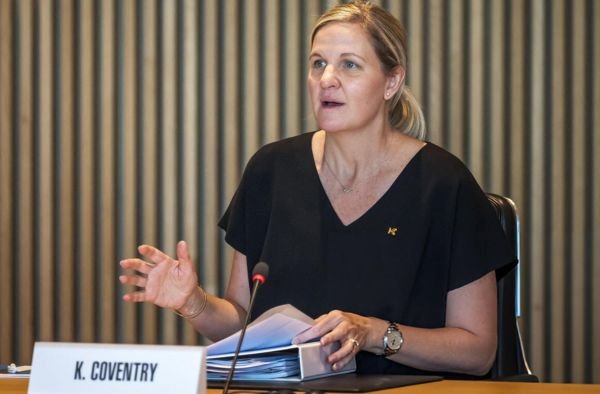The International Olympic Committee (IOC) is at the center of a heated global debate as its new president, Kirsty Coventry, has vowed to take a leading role in “protecting the female category” in sport. This move comes amid a growing wave of transgender athlete participation and mounting calls for clear, science-based policies that balance inclusion with fairness.

A Historic Shift in Olympic Leadership
Kirsty Coventry, a seven-time Olympic medalist and the first woman and African to lead the IOC, wasted no time addressing one of the most contentious issues in modern sport. In her first press conference as president, Coventry announced the formation of a working group tasked with developing consensus guidelines on gender eligibility, specifically focusing on the protection of women’s categories in Olympic competition.
“It was very clear from the members that we have to protect the female category, first and foremost to ensure fairness,” Coventry stated, highlighting the “overwhelming support” from IOC members for this new direction.
Why Is This Happening Now?
The IOC’s approach to transgender athletes has evolved rapidly. In 2021, the committee left gender eligibility decisions to individual sports federations, expecting policies to be fair, inclusive, and science-based. However, controversies at recent Games—such as the participation of Algerian boxer Imane Khelif and Taiwan’s Lin Yu-ting, both of whom faced scrutiny over gender eligibility—have put the IOC’s hands-off stance under the microscope.
Key Factors Driving the Debate
Fairness and Safety: Many sports federations, including World Athletics and World Aquatics, have recently banned transgender women who experienced male puberty from elite female competitions, citing fairness and safety concerns for cisgender women.
Scientific Complexity: The IOC and federations are grappling with scientific data on the impact of puberty, hormone levels, and physiological differences, which remain hotly debated in both the scientific community and the public.
Global Pressure: Governments, advocacy groups, and athletes are demanding clarity and consistency in how gender eligibility is managed at the highest levels of sport.
What Will the IOC’s Working Group Do?
Coventry’s working group will bring together experts, international federations, and stakeholders to craft a unified policy framework. The group aims to:
- Develop science-based, consensus-driven guidelines for gender eligibility.
- Address differences between sports while maintaining consistent principles.
- Ensure the protection of the female category without retroactive changes to past competitions.
This marks a significant departure from the IOC’s previous policy, signaling a more centralized and proactive approach to one of sport’s most sensitive issues.
The Trans Athlete Perspective
While the IOC’s move is widely supported by its members, it has drawn criticism from advocates for transgender inclusion. Critics argue that claims of unfair advantage are not always supported by scientific evidence and that existing policies already ensure fairness through strict hormone and eligibility requirements.
Arguments From Inclusion Advocates
- Lack of Scientific Consensus: Research shows that trans women do not always have an inherent athletic advantage over cisgender women.
- Diversity in Performance: Athletic success is shaped by many factors beyond biology, including training, determination, and teamwork.
- Existing Safeguards: Many governing bodies already have rigorous, evidence-based policies to ensure a level playing field.
What’s Next for the Olympics?
The IOC will finalize the scope and membership of the new working group in the coming weeks. Coventry has emphasized that any new policies will not be applied retroactively, focusing instead on future competitions and learning from past experiences.
What to Watch For
- The timeline for the working group’s recommendations.
- How international federations respond to new IOC guidelines.
- The ongoing balance between inclusion, fairness, and scientific evidence in Olympic sport.
FAQs
1. Why is the IOC focusing on protecting the women’s category now?
Recent controversies and growing participation of transgender athletes have intensified calls for clear, science-based policies to ensure fairness in women’s sports categories.
2. What changes is the IOC proposing?
The IOC is forming a working group to develop unified, science-based guidelines on gender eligibility, moving away from its previous hands-off approach.
3. Will transgender women be banned from all female Olympic events?
No blanket ban has been announced. The working group will seek consensus and may recommend sport-specific policies, but the focus is on fairness and protecting women’s categories.
4. How do current rules impact transgender athletes?
Currently, individual sports federations set their own policies, with many requiring transitions before puberty or setting strict hormone limits.
5. What is the scientific consensus on trans athletes’ advantages?
There is ongoing debate. Some studies suggest advantages for those who transitioned after puberty, while others argue that existing policies already ensure fairness.
Conclusion
Kirsty Coventry’s call to “protect the female category” marks a pivotal moment for the Olympic movement. As the IOC takes a more active role in shaping gender eligibility policy, the world will be watching to see how it balances fairness, inclusion, and the evolving science of sport. The outcome could set the standard for global athletics in the years to come.


